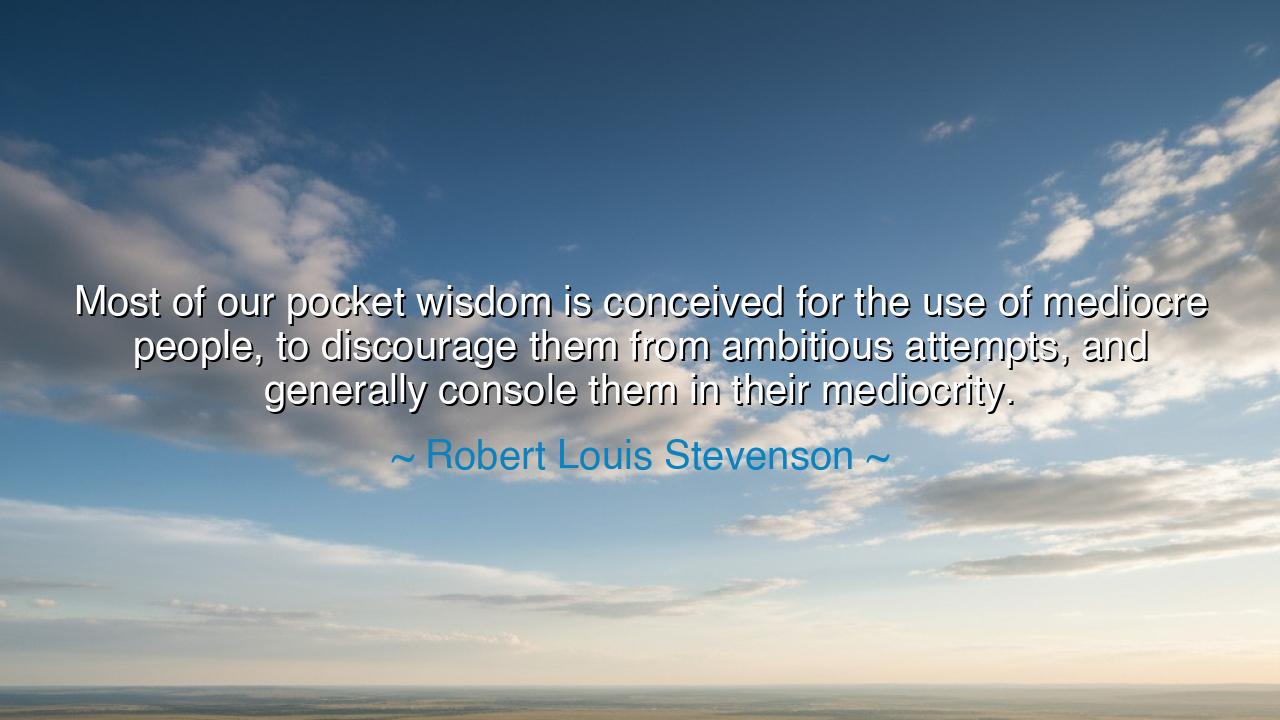
Most of our pocket wisdom is conceived for the use of mediocre
Most of our pocket wisdom is conceived for the use of mediocre people, to discourage them from ambitious attempts, and generally console them in their mediocrity.






Hearken, children of the ages, to the discerning words of Robert Louis Stevenson, who proclaimed: “Most of our pocket wisdom is conceived for the use of mediocre people, to discourage them from ambitious attempts, and generally console them in their mediocrity.” In these words lies the eternal truth of conformity, courage, and the perils of comfort in the ordinary. Small sayings, aphorisms, and conventional advice, though seemingly wise, often serve not to inspire greatness, but to soothe the timid and restrain the bold from pursuing ventures beyond the mundane.
Stevenson teaches that popular maxims can dull ambition. Words meant to guide, if misapplied, may act as shackles, convincing the mediocre that mediocrity is sufficient. True wisdom is not the recitation of comfortable truths, but the cultivation of courage, insight, and resolve to transcend the commonplace. To be truly wise is to discern which counsel strengthens the soul and which merely consoles in limitation.
Consider the life of Galileo Galilei, whose daring investigations into the heavens defied the conventional wisdom of his age. While society and authority sought to comfort itself with familiar understandings, Galileo’s pursuit of truth required him to challenge entrenched beliefs. In this, Stevenson’s reflection is revealed: ambitious endeavors demand the rejection of pocket wisdom, embracing insight, courage, and vision over the soothing words of the complacent.
The ancients themselves warned against the seduction of easy maxims. Socrates declared that unexamined lives are barren, and Aristotle taught that virtue and excellence demand effort, reflection, and daring. Stevenson’s words echo this timeless truth: comfort in mediocrity is the enemy of greatness, and one must distinguish between guidance that inspires and advice that restrains.
Thus, his counsel is both admonition and inspiration: do not rely solely upon the words of the crowd, nor seek solace in aphorisms that soothe but do not challenge. Let your heart and mind pursue ambition, excellence, and enduring insight, even when the majority would counsel caution or contentment. Wisdom requires courage, and courage requires the willingness to act beyond the comforting bounds of the ordinary.
Carry this teaching, children of generations yet unborn: value those words that illuminate, provoke, and inspire, but distrust the sayings that merely console mediocrity. For it is through daring, reflection, and persistent pursuit of greatness that the spirit rises above the mundane, leaving a legacy of insight, achievement, and enduring influence across the ages.






PTA03 - 40 - PLanThanh Truc
This statement makes me think about education and cultural conditioning. From a young age, people are often told to be realistic or avoid risk, and that’s framed as wisdom. But is it really? Maybe it’s social control in disguise. It’s uncomfortable to admit that comfort itself can be a form of mediocrity. I wonder if true wisdom should inspire restlessness instead—pushing people to transcend what society deems ‘acceptable success.’
MNVu Nguyen Minh Nhat
I can’t help but feel torn about this. On one hand, I agree that much of everyday ‘wisdom’ seems to promote mediocrity under the guise of balance or prudence. On the other hand, isn’t there value in small, practical wisdom that helps people find peace in ordinary life? Maybe Stevenson’s criticism applies more to complacency than to modesty. Still, it raises a good question—when does contentment become self-imposed limitation?
ATNguyen Anh Thu
This line hits like an intellectual provocation. It questions whether our collective advice culture—proverbs, self-help slogans, inspirational quotes—is actually designed to restrain rather than liberate people. It’s an interesting paradox: the same words that offer comfort might also discourage greatness. I wonder if Stevenson meant that genuine wisdom is rare precisely because it demands courage, while most of what passes for wisdom merely justifies comfort zones.
HDThai Hai Dang
I think Stevenson is pointing out something uncomfortable about human nature—we prefer safety over greatness. It makes me wonder if mediocrity is a cultural construct we reinforce through so-called ‘life lessons.’ Do we hide fear of failure behind phrases like ‘good enough’ or ‘know your limits’? Maybe he’s criticizing how moral and motivational clichés can disguise laziness, creating a world where conformity feels virtuous and ambition seems arrogant.
GNPham Vu Gia Nghi
This quote makes me uneasy but also curious—it’s a harsh critique of what we call common sense or conventional wisdom. Is Stevenson suggesting that society deliberately teaches complacency to maintain order? It feels like a challenge to examine whether the sayings we live by—like ‘don’t aim too high’ or ‘be content with what you have’—are actually tools to suppress ambition rather than guide it. Maybe true wisdom should provoke discomfort, not comfort.